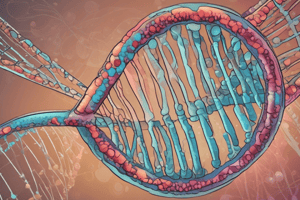Podcast
Questions and Answers
Why might Joe Schmoe not get lung cancer despite smoking three packs of cigarettes a day?
Why might Joe Schmoe not get lung cancer despite smoking three packs of cigarettes a day?
- High activity of DNA repair genes (correct)
- Low activity of genes that detoxify carcinogens
- High activity of genes that form carcinogenic metabolites
- Low activity of genes involved in DNA repair
What is a known outcome of DNA damage?
What is a known outcome of DNA damage?
- Cancer (correct)
- Aging
- Immunity
- Inflammation
What is the result of Kultima's (2000) study on Valproic Acid?
What is the result of Kultima's (2000) study on Valproic Acid?
- Increased expression of metallothionein (correct)
- No change in gene expression
- Increased DNA repair gene activity
- Decreased expression of metallothionein
What is the mechanism of teratogenicity of Valproic Acid?
What is the mechanism of teratogenicity of Valproic Acid?
How might Toxicogenomics and DNA microarrays be of value with respect to variability in liver enzymes and DNA repair?
How might Toxicogenomics and DNA microarrays be of value with respect to variability in liver enzymes and DNA repair?
Why is Valproic Acid avoided in pregnancy?
Why is Valproic Acid avoided in pregnancy?
What is the role of metallothionein in fetal development?
What is the role of metallothionein in fetal development?
Flashcards are hidden until you start studying
Study Notes
DNA Repair Genes
- DNA repair genes are polymorphic, meaning they function at different levels in different individuals.
- Individuals have varying abilities to repair DNA damaged by toxins, UV radiation, chemotherapy, etc.
DNA Damage and Cancer
- A known outcome of DNA damage is cancer.
- High activity of genes that detoxify carcinogens, low activity of genes that form carcinogenic metabolites, and high activity of DNA repair genes can contribute to an individual's resistance to cancer.
Toxicogenomics and DNA Microarrays
- Toxicogenomics and DNA microarrays can be used to determine which individuals are at risk for long-term adverse effects following toxin exposure.
- They can help identify variability in liver enzymes and DNA repair.
Mechanism of Drug Teratogenicity: Valproic Acid
- Valproic acid is avoided during pregnancy due to birth defects, but the mechanism of teratogenicity is unknown.
- Kultima's (2000) study used toxicogenomics and DNA microarrays to show that valproic acid exposure increases the expression of certain mouse fetal genes.
- One of these genes is metallothionein, which is associated with fetal zinc deficiency, a key cofactor.
Studying That Suits You
Use AI to generate personalized quizzes and flashcards to suit your learning preferences.





